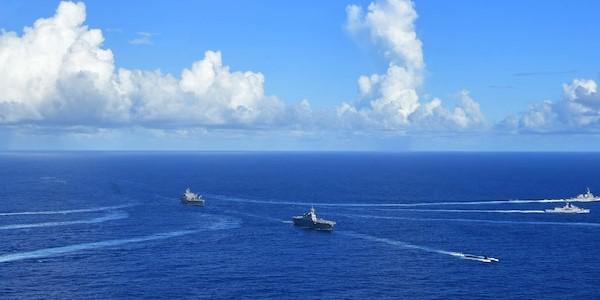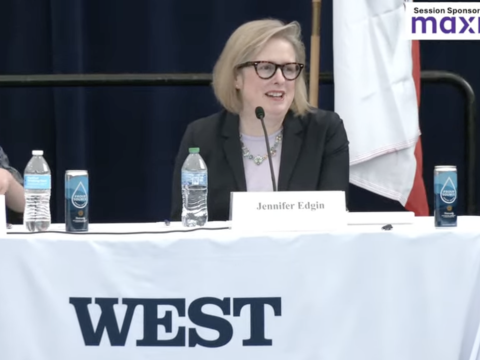Lack of Separate OCO Funds Present a Problem
The Fiscal Year 2022 Presidential budget request, released May 28, included $715 billion for the Department of Defense. Unique to that budget was the discontinuation—for the first time in 20 years—of separate Overseas Contingency Operation, or OCO, funds. Instead, the DoD’s direct war and enduring operation costs are now included as part of the base budget request, according to Secretary of Defense Lloyd Austin.
The move stems from President Biden’s decision to withdraw U.S. troops by the end of September from Afghanistan, where a good portion of continued overseas operations and expenses had occurred.
However, having OCO funds squeezed into the services’ base-level funding sent budget chiefs scrambling to reconcile how to obtain emergency operating money.
“The DoD highlighted no more OCO, or overseas contingency operations, the term given to supplemental appropriations,” explained Adm. Jonathan Greenert, USN (Ret.), former chief of Naval Operations, as part of a panel at West 2021, cosponsored by AFCEA International and the U.S. Naval Institute. “And that is going to be embedded in the base budget. What was going to be outside of that budget as a supplemental appropriation, or OCO, is now embedded in there. And I guess that makes the $715 billion request $60 billion cheaper than it would have been otherwise. It would have been $775 with regard to the Treasury.”
Adm. Jon Greenert @USNavy (Ret), former Chief of Naval Operations: #WEST2021: The sea services are dealing with a three-headed hydra in wrestling the FY 21 budget, the FY 22 budget as well as the 5-year/6-year plans pic.twitter.com/0BsytkthU5
— Kimberly Underwood (@Kunderwood_SGNL) June 29, 2021
First, the move presents a problem in regard to outstanding bills from last year’s contingency operations, said Rear Adm. John Gumbleton, USN, deputy assistant secretary of the Navy for Budget; director, Fiscal Management Division, N82, Office of the Chief of Naval Operations. “With our FY21 budget the services have bills to pay from contingency operations, whether it be COVID or capital security or border security,” he confirmed. “And we're simply going to have to pay them. That is just the state of affairs.”
Next, in regard to the FY 22 budget going forward, the lack of separate OCO funds will absolutely be a detriment to the sea services, Adm. Gumbleton said.
RADM John Gumbleton, DSA of the Navy for Budget @USNavy: We took $1.8 B that was going to be spent on the destroyer and invested it instead in readiness for today, modernization for tomorrow, and investments for the future. #WEST2021 pic.twitter.com/73GGS99PtW
— Kimberly Underwood (@Kunderwood_SGNL) June 29, 2021
“The Navy is a unique service in that it never was 100% constabulary,” he noted. “In a more meaningful way in Afghanistan and Iraq, our support was through long-range carrier strike support or maritime support. So, when those OCO dollars went away for maritime, we didn't stop steaming across the ocean or paying those sailors or doing the maintenance on those aircraft. They simply steam in the Indo-PACOM AOR [Indo-Pacific area of responsibility] where they are needed more. But the money went away. And that is a significant impact to our future Palm planning, and it is undoubtedly an impact to the United States Navy.”
Furthermore, it is unclear how the service will handle future unplanned operations, Adm. Gumbleton continued. “It is probably an unknown answer as to how we will do this in future contingencies,” he stressed.
The Marine Corps is in a similar place to the Navy, shared Lt. Gen. John Jansen, USMC, deputy commandant, Programs and Resources, U.S. Marine Corps. “Prior to OCO, the whole idea in the past was that you had a base budget,” Lt. Gen. Jansen stated. “It was planned and programmed and budgeted to execute organizing, training and equipping [functions], so you would be ready. And if there was an operation or some type of activity that was unbudgeted, then on top of the enacted budget Congress would add supplemental language authorities and funding to provide for those activities, such as Bosnia, the Balkans. But we got into a level of crisis action and combat in Iraq and Afghanistan where it became so predictable and so expensive that it became part of the budgeting process.”
LG John Jansen, deputy commandant, Programs & Resources @USMC: Immense pressure to make budget cuts & the Marine Corps has already divested $8 billion decreasing by 12k Marines. It is looking at a further $7 billion reduction to be able to modernize. It is a challenge. #WEST2021 pic.twitter.com/8AtMfcYETc
— Kimberly Underwood (@Kunderwood_SGNL) June 29, 2021
The Marines had to perform a detailed examination of its in-country, in-theater and in-continental United States activities that supported the combat contingency operations in Afghanistan, Iraq and Syria. “There was a lot of scaling down and a lot of pain to get out of patterns and to stop doing certain things,” he noted.
Gen. Jansen emphasized that it is more than $3 billion of resources “that we had patterns of activity to which we expected to conduct operations, which are now no longer.”
Additionally, the Marines are also on the hook for COVID operations. “I can tell you that it has been challenging this year to resource COVID,” the general acknowledged. “Last year we got a COVID supplemental. This year and maybe they'll get to it, and I'm not presupposing Congress, but we have not seen one. And it is a discussion up at this level about how we are going to organize ourselves as a nation to resource unplanned, unprogrammed, unbudgeted activities.”
Meanwhile, the Coast Guard also received OCO funds, primarily for the so-called Patrol Forces Southwest Asia, operating in the Persian Gulf. The service has such six, 110-foot patrol boats working for 5th Fleet, “doing everything that's needed in that area,” explained Rear Adm. Mark Fedor, USCG, assistant commandant, Resources, and chief financial officer, U.S. Coast Guard. “They have really been there since shortly after 9-11.”
And even though it will move from the OCO funding cuts in a net neutral position, Adm. Fedor noted that the Coast Guard still must handle strains to the base budget due to unexpected contingency operations. “Just like my counterparts mentioned, it doesn't really help you in that contingency area,” he said.
The Coast Guard has proposed a new appropriation structure as part of its FY 22 budget request, which also will include a new contingency fund. “There are a lot of negotiations about how big should that contingency fund be,” Adm. Fedor stated. “It is really meant for the Coast Guard to be able to respond to any natural disasters. But again, it is a finite amount of money, and if you expand that in a busy hurricane season or heaven forbid, another kind of 9-11 type of incident happens, you could quickly go through that and then we probably be at the point where we would have to ask for a reprogramming or some other means to fund our operations.”
"Our FY 22 budget does really start to get after Coast Guard readiness," says RDML Mark Fedor (top right), assistant commandant, Resources & CFO @USCG. "But we do really need to sustain this level of funding going forward." #WEST2021 pic.twitter.com/FJRl3j28jb
— Kimberly Underwood (@Kunderwood_SGNL) June 29, 2021
“Truly this is new ground for us,” Adm. Gumbleton said. “Whatever the next contingency is there will be only two choices: either ‘eat it’ and therefore don't do something else, and then request through the four defense [Congressional] subcommittees to reprogram moneys or seek a supplemental. And I don't know of any other available options.”



Comments